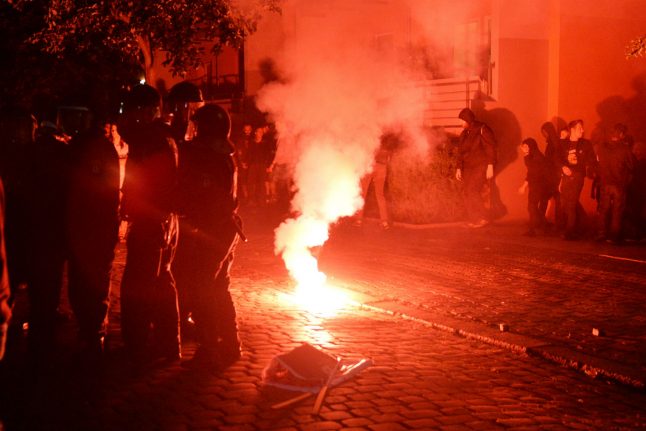“2016 was marked out by a spiral in left-wing violence that not only led to a multitude of serious crimes, but also in part to a radicalized tone – which has seen calls for the murder of police officers and politicians,” the ministry warned in its security report for 2016, released on Tuesday.
“The inhibition threshold regarding physical attacks is sinking, and we are now at the stage where targeted assassination of political opponents no longer appears completely unrealistic,” the report states.
Several violent confrontations between police and left-wing protesters around Rigaer Strasse, a left-wing street in the east of Berlin which holds deep symbolic significance for the far left, were central to the radicalization in the scene, the report argues.
In January 2016, 500 officers raided a left-wing squat in the street after four people in masks attacked a police officer.
Police again moved to clear out squatters in the bottom floor of Rigaer Strasse 94 in June last year, an operation which was later deemed illegal by a city court. The operation led to heavy left-wing riots in which dozens of cars were burned and over 100 police officers were injured.
Tuesday's interior ministry report claims that the far-left purposefully escalated battles with police in order to win sympathy for their cause, a strategy they were successful in.
The far-left scene were able to increase their ranks by 150 members over the course of the year to 2,790 members, while Berlin police recorded a rise in overall crime committed by the far-left, and an increase in violent crime.
SEE ALSO: 10 things you ought to know about the RAF terrorist organization
Over the course of the year graffiti calling for the murder of police officers and members of the city government multiplied, with a picture of a gallows with the inscription “a cop could hang here” a particularly common image.
Also recorded during the year was a partly violent campaign of intimidation against the right-wing Alternative for Germany (AfD) party, which involved crimes ranging from property damage to assault.
During the build up to the state election in Berlin in September 2016, attacks on offices and properties associated with the AfD became particularly common, with party members violently assaulted on several occasions.
In one incident, an AfD member manning an election stand in the Neukölln district of Berlin was attacked by six people, who beat him before spraying him with pepper spray.
Overall, the report painted a gloomy picture of a city blighted by ever worsening political extremism.
The number of far-right extremists remained at the record high reached in 2015. Meanwhilee more and more people were identifying with the Reichbürger movement, an ideology which rejects the current borders of Germany in favour of those which existed before 1945.
Crimes committed by the far-right dropped slightly, but the report emphasized that there was “no reason to say things are getting better.”
It also noted an increase in the number of Salafists in the capital to 880, some 410 of whom are potentially violent.
Interior Minister Andreas Geisel (Social Democrats), who presented the findings on Tuesday, announced plans to almost quadruple the budget for preventing young people from falling into extremism to €4.7 million.



 Please whitelist us to continue reading.
Please whitelist us to continue reading.